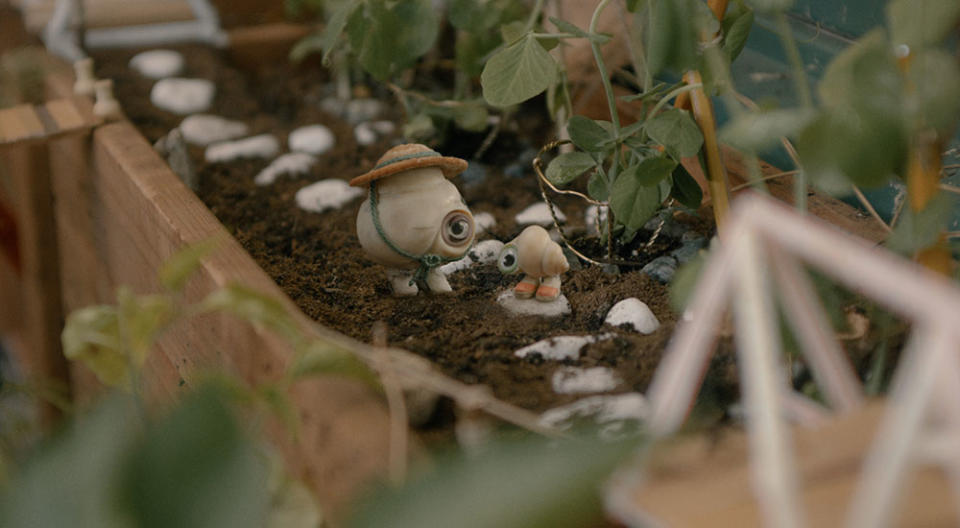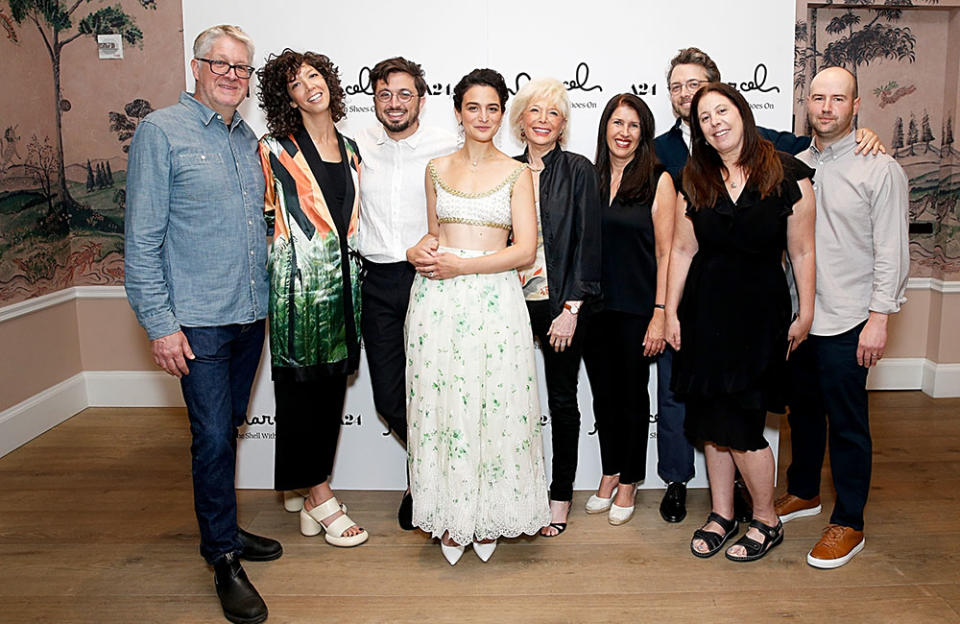Why Seeing ‘Marcel the Shell’ Was an “Out-of-Body” Experience for Star Lesley Stahl
- Oops!Something went wrong.Please try again later.
- Oops!Something went wrong.Please try again later.
- Oops!Something went wrong.Please try again later.

Marcel the Shell With Shoes On — the A24 feature film from Dean Fleischer-Camp and Jenny Slate based on their viral hit starring an animated mollusk with one eye and a pair of kicks — is a tribute to the power of family, the comfort of grandmothers … and legendary 60 Minutes reporter Lesley Stahl.
She is praised as “fearless” and “heroic” in the film, in which she plays herself in scenes depicting an interview with Marcel. But it wasn’t until she was seated in the theater for a preview screening that Stahl learned of the magnitude of the homage. “I was stunned and a little embarrassed. I blushed,” Stahl tells THR of seeing the film alongside 60 Minutes colleagues, including producer Shari Finkelstein, who also plays herself in the film. “I was embarrassed that I’d asked them to come see such a love letter to me. The whole experience of seeing it has been out-of-body.”
More from The Hollywood Reporter
Below, Stahl explains why she said yes to the project, what it was like to act opposite a “brilliant” but suffering Slate and whether or not she sees more film roles in her future.

When did you first hear the name Marcel the Shell and what did you think of him?
I first heard about Marcel when Shari Finkelstein, the producer I work with regularly at 60 Minutes, called me and asked, “Would you want to be in a movie about Marcel the Shell with Shoes on?” I said, “What? Who?” When she called, I had not only never seen any of the YouTube clips, but I had not even heard about it. She described it to me, and I thought, well, this is very strange. Very strange, but I totally trust Shari. She is one of the great 60 Minutes producers, and she told me that Marcel was popular, well-known and quite famous — more famous than I was. She said that she thought it would be fun and a good thing to do.
Filmmaker Dean Fleischer-Camp and his producer Elizabeth Holm have said that securing 60 Minutes and your participation was a multiyear process. How closely did you follow that process? Did Shari give you incremental updates as it went along?
Well, first of all, Shari had already agreed to be in the film as a voiceover. She had told me that she’d gone through a kind of strenuous process to get approval to do that and to be called “a 60 Minutes producer.” Then I agreed to do it, and it went away. I don’t remember exactly how long, maybe a year or more. It just disappeared. I actually thought it had gone away for good and I assumed that it wasn’t going to happen because if it were, I would have heard something. Then, when Shari and I were out working on a story together and I asked, “I guess that [Marcel movie] didn’t happen, right?” And she said, “No, no it’s in the works,” which surprised me. Shortly after that, the approval came through. I guess what Dean and the other filmmakers on the project wanted was what you see [in the film], which was to fully incorporate 60 Minutes — from the music and the logo to our clock and having me in our own studio. It just took forever.
Authenticity seemed to be very important to the filmmakers, from casting you and Shari but also hiring your real 60 Minutes crew to appear as the 60 Minutes crew in the film. How important was that to you, to film with people who are already your colleagues?
Extremely important, extremely important, because I really care a lot about how I’m lit and the quality of the production. I care enormously about that and have always from the day I got to 60 Minutes. Actually, even before that when I was working in hard news. The fact that I had my favorite camera people there and some of my favorite crew meant a lot. By the way, it was not something that I made as a condition at all, but that they were there and that Shari was part of it was very comforting.
To film the scene where you’re interviewing Marcel, I’ve read that Jenny Slate was crouching on the floor so she could be at your eye level. What was that experience like?
No, Chris, she did not crouch. She laid on the floor at my feet. She may not remember, but she had a serious issue with her back. She was in pain, this poor girl, and was lying flat on her back at my feet. And she was hilarious. She was riffing and ad-libbing and she was brilliant. I was a little disappointed that more of her [improv] in taking these side trips and avenues off the main course were not used and they were not able to incorporate them into the finished film because they had nothing to do with the script as it moved forward. The little tangents that she would go off on, she was mind-blowingly smart. I got to appreciate how she was not just funny, she was smart funny.
She has said that although you’re not a trained improviser, you really are a trained improviser as a journalist because you’re always reacting to the moment and going off-script by veering from your prepared questions to adjust to the moment. How was it to improvise with her?
That was normal. That is what we do. I always come to a major interview prepared — and believe me, interviewing Marcel was a major interview. He would’ve been the center of our story, and the piece then would have depended on a strong interview, and that means I am strong and the subject is equally powerful, articulate and responding in the moment. [Improv] is pretty much what we do. I have to be prepared to deviate from my prepared questions and follow wherever the subject takes me.
I also read that you rewrote or reworded the segment intro because it didn’t feel authentic to you. Do you remember exactly how you redid that or why?
I don’t remember the wording, but I remember going to Shari and saying, “We would never say that,” or “We would ever use language like that.” I think that it was more subjective than we would ever use. We would always speak in the third person. There’d never be an “I” in the studio. We did work to make it conform more with our style, and they approved our little changes.
This film is a real love letter to Lesley Stahl and to 60 Minutes. Obviously, your career speaks for itself and you have the résumé and awards to prove it, along with legions of fans and admirers. But I would imagine it’s a much different experience hearing all of these beautiful compliments on a big screen. How are you at receiving compliments, because there are a lot of them coming at you in this film?
Oh my God. It’s funny that you are bringing this up because no one has talked to me about this until right this moment. The first time I saw the film was in a little studio with other people. I had no idea what was coming or that I was being described as “fearless” and “heroic.” I was stunned and a little embarrassed. I blushed. No one saw it because we were in the dark. Shari was there, and I had invited some of our colleagues to come and see it with me, but then I was embarrassed that I’d asked them to come see such a love letter to me. I was really surprised.
You know, I did my part and went and interviewed Marcel, which was peculiar to say the least as it was interviewing an inanimate object, a little half-inch plastic object. That was one thing, and then come to find out how I was being portrayed, which I had no idea was coming. What I have subsequently learned is that the original concept was that Dean didn’t watch television so Marcel and his grandmother didn’t watch television either, except they could watch through the window of their next-door neighbor. And the next-door neighbor fell into the 60 Minutes demographic, which is older as we skew older. The neighbor didn’t watch any dramas or any comedies, so the only thing Marcel and his grandmother could see was 60 Minutes. That made me laugh.

The film is not only a love letter to Lesley Stahl but also to families as well as grandmothers, as Nana Connie is the heart of the story. That also made me think of you as someone who is a grandmother and has written a book about being a grandmother. Did seeing that play out onscreen give you pause, knowing how close you are with your own grandchildren?
It didn’t give me pause. I think it’s just serendipitous that there was this background. I don’t think they wanted me in the film because I wrote a book about being a grandmother; it was coincidental. But when I saw the movie — I’ve seen it twice now and am going a third time soon with my grandchildren, who haven’t seen it yet — I wondered if anybody else had made the connection that you have. The whole experience of seeing it has been out-of-body. There were these waves of connections within my body about being presented the way I was. It’s thrilling.
Seeing you in the film and now hearing about you going to the movie theater again made me wonder, what kinds of movies do you like to see when you go to the movie theater?
I have missed going to the movies over these last two years because of COVID. I miss it deeply in this period. This is kind of personal, but I’ll tell you — and it’s on the record: My husband has Parkinson’s disease. He got COVID. We got it together right at the very beginning. It really disrupted the course of his disease. Parkinson’s is a progressively degenerate disorder, and he was going along in a very slow, incremental, downward trend, but not bad. When he got COVID, he just went off the side of the cliff. I cannot go to the movies with him now. I can’t take him. Outside of seeing Marcel and one other movie that I saw for a story I was working on, I have not been to a theater to see a movie and it breaks my heart.
But we are watching a lot of movies at home with streaming. We have a big television, but it’s not the same. I miss going to theaters. [Editor’s Note: Stahl’s husband, Aaron Latham, passed away Saturday at age 78.]
This is not your first onscreen role. You have appeared in Murphy Brown, Frasier, Madagascar: Escape to Africa, Eagle Eye and a couple of other projects. I love that you told your CBS colleague that you are available for more and ready for another go. Is there a dream of joining a specific type of film or franchise?
That’s a good question. My husband wrote several movies and now my daughter [Taylor] is in the movie business. She hasn’t asked me to be in any of her projects. Maybe that would be really fun, to be produced by my own little kid. I’d love to send her a little hint. Hey, Taylor, hint, hint.
A version of this story first appeared in the July 27 issue of The Hollywood Reporter magazine. Click here to subscribe.
Best of The Hollywood Reporter

